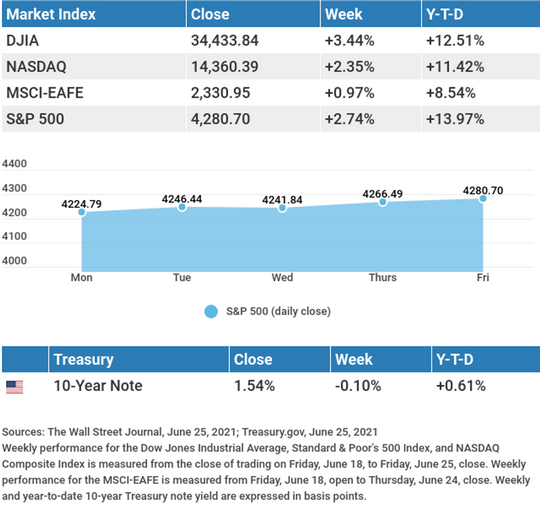
Stocks reached new all-time highs last week as markets staged a strong rebound from the previous week’s declines.
The Dow Jones Industrial Average rose 3.44%, while the Standard & Poor’s 500 picked up 2.74%. The Nasdaq Composite index increased 2.35%. The MSCI EAFE index, which tracks developed overseas stock markets, gained 0.97%.1,2,3


Stocks Climb
Stocks rallied on the first day of trading last week and gained further momentum on Thursday and Friday. Despite some discouraging data on housing and initial jobless claims, stocks managed to set new highs, as investors cheered an agreement between President Biden and a group of senators that appeared to pave the way for the passage of a $1 trillion infrastructure bill.4
Positive results from the Federal Reserve’s stress tests of banks, which raised the prospect of banks raising their dividend payouts and share buybacks, and a key inflation measure coming in at market expectations provided impetus for further gains. The S&P 500 had its best week since February and ended the five-trading days at a record high.5
Housing Headwinds
Historically low mortgage rates, the COVID-19 pandemic, and a flush consumer have contributed to a very strong housing market in recent months. Last week’s housing data for May, however, showed that housing may be running into headwinds. The rising cost of materials and labor led to a 5.9% decline in new single home sales in May even as the median price hit an all-time high.6
Meanwhile, sales of existing homes fell 0.9%, the fourth-straight month of declines, owing to a very low inventory. High demand, coupled with a depressed supply, led to a 23.6% increase in the median price of an existing home.7
Robert Roman
CEO, Managing Director
THIS WEEK: KEY ECONOMIC DATA
Tuesday: Consumer Confidence.
Wednesday: ADP (Automated Data Processing) Employment Report.
Thursday: Jobless Claims. ISM (Institute of Supply Management) Manufacturing Index.
Friday: Employment Situation Report. Factory Orders.
Source: Econoday, June 25, 2021
The Econoday economic calendar lists upcoming U.S. economic data releases (including key economic indicators), Federal Reserve policy meetings, and speaking engagements of Federal Reserve officials. The content is developed from sources believed to be providing accurate information. The forecasts or forward-looking statements are based on assumptions and may not materialize. The forecasts also are subject to revision.
THIS WEEK: COMPANIES REPORTING EARNINGS
Wednesday: Micron Technology, Inc. (MU), Constellation Brands, Inc. (STZ), General Mills, Inc. (GIS).
Thursday: Walgreens Boots Alliance, Inc. (WBA), McCormick & Company, Inc. (MKC).
Source: Zacks, June 25, 2021
Companies mentioned are for informational purposes only. It should not be considered a solicitation for the purchase or sale of the securities. Investing involves risks, and investment decisions should be based on your own goals, time horizon, and tolerance for risk. The return and principal value of investments will fluctuate as market conditions change. When sold, investments may be worth more or less than their original cost. Companies may reschedule when they report earnings without notice.

“Lasting change is a series of compromises. And compromise is all right, as long your values don’t change.”
– Jane Goodall

Tax Season May be Over, but the Taxpayer Bill of Rights Applies Year-Round
Even though filing season might be over for the majority of taxpayers, the IRS is available year-round for any questions you might have. They also have a Taxpayer Bill of Rights, which promises the level of service and information you will receive when working with the IRS.
Here are the 10 fundamental rights you have as a taxpayer when interacting with the IRS:
- The right to be informed: As a taxpayer, you have the right to know what is required to comply with tax laws.
- The right to quality service: You will receive prompt, courteous, and professional assistance.
- The right to pay no more than the correct amount of tax: You only pay what is legally due, including interest and penalties.
- The right to challenge the IRS’ position and be heard: You have the right to object to IRS actions and provide further justification with documentation.
- The right to appeal an IRS decision in an independent forum:Taxpayers are entitled to a fair and impartial administrative appeal of most IRS decisions, including certain penalties.
- The right to finality: You have the right to know how much time you have to challenge an IRS position and how soon the IRS must audit your taxes.
- The right to privacy: All IRS inquiries, examinations, and enforcement won’t be more intrusive than necessary.
- The right to confidentiality: Taxpayers have the right to expect that their tax information will remain confidential.
- The right to retain representation: Taxpayers have the right to retain an authorized representative of their choice to represent them in their interactions with the IRS.
- The right to a fair and just tax system: Taxpayers have the right to expect fairness from the tax system. This includes considering all facts and circumstances that might affect their liabilities, ability to pay or provide information in a timely fashion.
* This information is not intended to be a substitute for specific individualized tax advice. We suggest that you discuss your specific tax issues with a qualified tax professional.
Tip adapted from IRS.gov8

Health Benefits of Garlic
Not only is garlic delicious, but it also has many potential health benefits.
One of the most powerful benefits of garlic is that it may help your immune system and may help you combat sickness, including the common cold. One large, 12-week study found that a daily garlic supplement reduced the number of colds by 63% compared to a placebo. The average length of cold symptoms was also reduced by 70%, from 5 days in the placebo group to just 1.5 days in the garlic group.
Garlic may also improve cholesterol levels, which may lower the risk of heart disease. Garlic may lower both total and LDL cholesterol (otherwise known as the “bad” cholesterol).
So next time you’re making your favorite dish, you may want to consider adding a few cloves of garlic to your recipe.
Tip adapted from Healthline.com9

Can you write down eight eights so that they add up to one thousand?
Last week’s riddle: Before Mt. Everest was measured, in 1819, what was the highest mountain on earth? Answer: Mt. Everest was the highest – it simply hadn’t been measured yet.


Footnotes and Sources
1. The Wall Street Journal, June 25, 2021
2. The Wall Street Journal, June 25, 2021
3. The Wall Street Journal, June 25, 2021
4. CNBC, June 23, 2021
5. CNBC, June 23, 2021
6. Fox Business, June 23, 2021
7. CNBC, June 22, 2021
8. IRS.gov, January 21, 2021
9. Healthline.com, June 28, 2019
Investing involves risks, and investment decisions should be based on your own goals, time horizon, and tolerance for risk. The return and principal value of investments will fluctuate as market conditions change. When sold, investments may be worth more or less than their original cost.
The forecasts or forward-looking statements are based on assumptions, may not materialize, and are subject to revision without notice.
The market indexes discussed are unmanaged, and generally, considered representative of their respective markets. Index performance is not indicative of the past performance of a particular investment. Indexes do not incur management fees, costs, and expenses. Individuals cannot directly invest in unmanaged indexes. Past performance does not guarantee future results.
The Dow Jones Industrial Average is an unmanaged index that is generally considered representative of large-capitalization companies on the U.S. stock market. Nasdaq Composite is an index of the common stocks and similar securities listed on the NASDAQ stock market and is considered a broad indicator of the performance of technology and growth companies. The MSCI EAFE Index was created by Morgan Stanley Capital International (MSCI) and serves as a benchmark of the performance of major international equity markets, as represented by 21 major MSCI indexes from Europe, Australia, and Southeast Asia. The S&P 500 Composite Index is an unmanaged group of securities that are considered to be representative of the stock market in general.
U.S. Treasury Notes are guaranteed by the federal government as to the timely payment of principal and interest. However, if you sell a Treasury Note prior to maturity, it may be worth more or less than the original price paid. Fixed income investments are subject to various risks including changes in interest rates, credit quality, inflation risk, market valuations, prepayments, corporate events, tax ramifications and other factors.
International investments carry additional risks, which include differences in financial reporting standards, currency exchange rates, political risks unique to a specific country, foreign taxes and regulations, and the potential for illiquid markets. These factors may result in greater share price volatility.
Please consult your financial professional for additional information.
This content is developed from sources believed to be providing accurate information. The information in this material is not intended as tax or legal advice. Please consult legal or tax professionals for specific information regarding your individual situation. This material was developed and produced by FMG Suite to provide information on a topic that may be of interest. FMG is not affiliated with the named representative, financial professional, Registered Investment Advisor, Broker-Dealer, nor state- or SEC-registered investment advisory firm. The opinions expressed and material provided are for general information, and they should not be considered a solicitation for the purchase or sale of any security.
Copyright 2021 FMG Suite.

